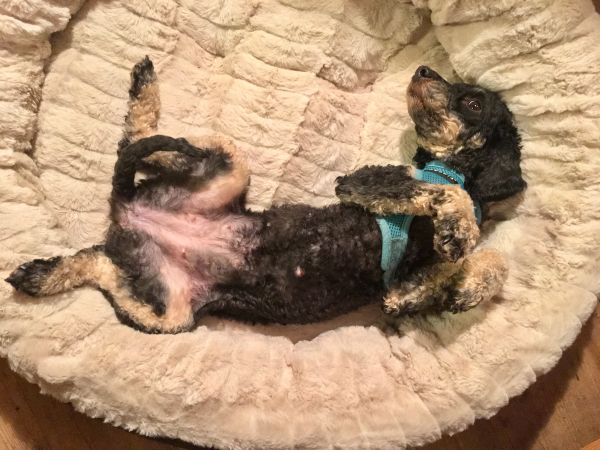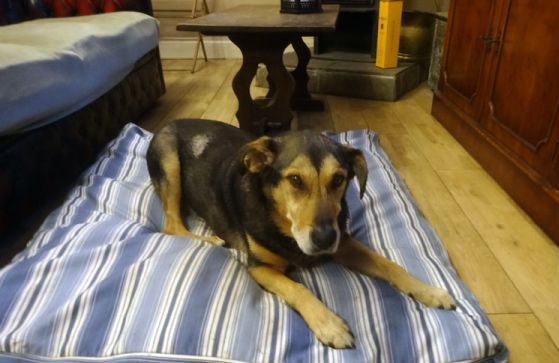Many dog owners ask why do dogs dig at their beds? And often do it after they walked a few circles around it. It’s a behavior referred to as denning, due to natural instinct. Although our pets are now domesticated, they still share the same DNA with their wild ancestors. This means that our sweet puppies may still exhibit some behaviors which no longer serve a purpose anymore, such as trying to create a safe place to sleep, to feel protected from danger, or to hide food.
Understanding Why Do Dogs Dig at Their Beds?

If you notice your pet digging into his bed, your furniture, your hardwood floors, or even outside, you shouldn’t be too concerned and looking for solutions. You haven’t done anything wrong in caring for him and he’s not suffering from some type of mental illness (Not in most cases at least). Chances are your pet is scratching at his spot before lying down for other reasons such as:
- They’re uncomfortable with the temperature
- Dogs dig at their beds to hide
- They dig to mark their territory
- Dogs dig to nest
- To get comfortable
- Check for danger
- Dogs dig at their beds to hide things
Dogs Dig at Their Beds to Regulate Body Temperature
Your pet does not have normal sweat glands to help regulate his temperature. This is why you often see them panting when they get hot. It’s their way of helping them cool down. In the wild, canines often dig holes to help control their temperature. A small, tight hole in the ground can provide coolness on a hot day because the turned-up soil is going to be a few degrees lower than the ground that’s exposed to the sun.
When it’s cold, the hole will help radiate the dog’s body heat. Think of how you might start off cool when you first climb beneath the sheets. The bed will warm up later from your body generated heat. The hole also nestles around them, providing walls, acting as a shelter from the wind.
This self-warming technique was passed on to your pet. This causes her to scratch or dig at her bed.
She might be trying to stir the bedding so that it’ll be cooler. Like we often flip our pillows to the cool side in the middle of the night. Or she could be trying to gather the blankets closer together so she can burrow inside, like a cocoon. And being nestled underneath blankets allows for your pet to be camouflaged, which helps them feel protected.
Dogs Dig at Their Beds For Safety

As domesticated pets, our dogs no longer have to worry about their safety while they sleep. However, it’s an ingrained trait that’s been passed down through thousands of years. In fact, you might be surprised at just how closely related your pup might be to wild wolves. If you own a Husky, it’s pretty evident. But did you know that the Pekinese is one of the closest DNA matches as well?
This ingrained cautiousness might lead your pup to perform a roundabout, which is when you’ll see him circling his bed a few times before scratching or digging. This is yet another protective instinct your dog inherited from his ancestors. He’s checking to make sure there isn’t anything dangerous hiding inside. This is an important protective mechanism for canines who live in the wild.
Once they get into their bed, they often burrow down deep. This allows them to be less visible. In the wild, this is useful, as it allows them to sleep peacefully, without being a target for predators. Your pet might not need to hide from enemies at home, but they’ll still feel the need to when sleeping. Provide extra blankets to help make them more comfortable.
Dogs Dig at Their Beds To transfer Their Scent
It’s no surprise that our pets like to mark their territory. How often have we seen a male dog shaking his leg every few feet on their walks? Or even worse, when they do it in the house. And you often see pets getting a bit possessive of their favorite toys, offering snarls or barks as a warning to their siblings to back away.
However, you might be surprised to learn that dogs can mark their territory another way. Dogs have glands in the pads of their feet that excrete their unique scent. This means when they paw at something, those glands began to leak, leaving behind their smell. When it’s theirs, it’s theirs and that certainly applies to their beds.
By scratching or pawing at his bed, your dog is covering it with his scent. This helps to make sure that any other dogs realize that it’s off-limits. If another dog encroaches, it can cause your dog to become agitated. Agitated dogs can often overreact to small infractions, so it’s best to keep an eye on your pet when others are around if you notice signs of aggression. Some things to watch for include raised hair, baring of teeth, low growling, or tense posture.
Dogs Dig at Their Beds to Hide
Your pet may be trying to dig a place for her to hide. This can happen if she’s nervous, scared, or stressed out. It’s an ancient instinctual behavior that they aren’t consciously doing. If you think your dog digging into her bed might be due to anxiety or fear, try moving her bed into a quieter area. Soothe her with slow strokes and soft whispers. Especially if she’s shaking.
Some breeds of dogs often become nervous when there’s too much activity occurring. Small dogs are often bad about this. When your pet becomes nervous, it can lead to aggression if they feel threatened. Anyone who’s ever suffered from an anxiety attack knows that even the slightest perceived threat can make you panic. Even if there isn’t any real danger.
Hiding is instinctual behavior dogs have inherited as a way to protect themselves from dangerous situations. You might see your pet digging away at his bed, even if there are no blankets when there’s a lot of people hanging around. If he hides completely under the covers and seems distressed, relocate him to a quieter area with less traffic.
Dogs Dig at Their Beds For Nesting
Nesting is a familiar occurrence when a female is pregnant. This behavior exists across species including dogs and humans.
Expecting canine mothers have their own version of nesting. You will often see pregnant females digging at the spot they’re about to lay in. This is an instinctual behavior to prepare the “nest” for her upcoming puppies, even if they’re not due for a while. On that note, it’s not uncommon to see non-pregnant females nesting. It’s something they can’t help but do.
Dogs Dig at Their Beds For Comfort

Getting comfortable should be a cause you aren’t surprised by. We want to sleep in comfort, otherwise, why have beds? Who doesn’t shift a hundred times, fluff our pillows, or rearrange our blankets before we can finally be still? It takes a while to find the perfect sleeping position.
Dogs are just like people. They want to be comfortable when they lay down. So they may dig in an effort to fluff their blankets into the right spot. Or to position the bed filling perfectly. My dog likes to have a pillow when he’s laying on the couch or in my bed. Before he will lay down, he has to knock the pillow all over at least four times and pile the blankets up so he can curl inside, his head on the pillow.
Dogs Dig at Their Beds For Safekeeping
I’m sure you can remember at least one movie or cartoon that shows a dog burying a bone in a backyard already full of bones. In the wild, dogs often bury food for later. This is useful in winter months when food becomes scarce. As a result, domesticated dogs often bury their own treasured items, much like their ancestors. If they don’t have access to a safe area outside, she might designate places indoors, including her bed.
If you notice your pet digging shortly after receiving a treat, you might want to take a peek once he’s distracted. He might be stockpiling. This isn’t a bad thing, as long as the stuff he’s storing isn’t perishable. He could also be storing bones, toys, or things he shouldn’t have such as shoes.
My kids have a habit of feeding our dog as they eat. it often leads to my pooch having too much food to consume at one time. So he’ll go around the house hiding it. This can lead to rotting food and horrible smells if you don’t keep a close eye out. I have to check my couch cushions at least once a week.
How to Stop Dogs From Scratching their beds

Unfortunately, this behavior is instinctual, meaning your pet may not be doing it just to misbehave. Therefore, it’s really not a habit that can be broken. If your pet is digging at the furniture, your bed, or the floor, set up their own comfortable bed and train them to use it. This allows them to dig as they desire, without causing damage. Or let them dig around outside.
You could consider sending your pet for obedience training if the digging is becoming too destructive. Or visit your vet to ensure there isn’t an underlying medical cause. If you’re looking for a way to minimize the damage your pet may be doing.
Experts recommend trying these tips.
Things to Try
The longer your puppy’s nails are, the more damage they can do when digging or scratching. Keep his nails trimmed short, reducing the chances of him being able to tear up the carpet or puncture holes in your couch. Nail trimming has numerous health benefits so it’s an important ritual that you should become accustomed to. If you can’t handle trimming your dog’s nails alone, take him to a vet, groomer, or spa.
Some vets recommend providing a new toy or distraction if the digging has become excessive and damaging. Or try behavior modification by commanding your dog “No” or “Stop” and then rewarding with a treat when the behavior ceases. If you are having trouble getting your pet to obey you, consider enrolling in obedience training.
You could also consider altering your pet’s bed to make it more comfortable. Some things you can do include adding more blankets or a different type of fabric to your pet’s bed. Or you could use a heavy blanket, as this would be harder to manipulate and tear. You could also select a newer bed. One with higher walls and thicker padding might reduce scratching.
Products That Might Help
If your dog is anything like mine, he’s picky about where he lays. You could spend a fortune on a new bed, only to have him turn his nose up and completely avoid it.
For pets who are transitioning from sleeping with you to their own bed, they’ll need to be incentivized to use their own spot. Offer praises and treats whenever they display the appropriate behavior. To ensure your pet makes good use of their new bed, try choosing a bed that’s comfy but durable.
One product you could try is a beanbag bed like this one. Rather than being filled with cotton or rice, this bed is made with polyfill, shaped into small little balls. And if you’re eco-friendly, you’ll really love this product because the polyfill is made using recycled bottles! The Berber material is soft and comfy, allowing your pet to rest easily. And it won’t tear as easy when they dig into it.
If your puppy continues to scratch despite a new bed, you could invest in nail caps. Nail caps are a useful product to help keep your pup’s claws covered. These pieces of vinyl easily slip over the nails, offering protection for your carpet, hardwood, and furniture. No more jagged tears and shredded memory foam all over the house. And you don’t have to worry about painful injuries if your puppy jumps in your lap either.
You could also try puppy socks. These slip over your dog’s feet and stay in place on their legs using elastic bands. This cute pair has anti-slip silicone gel on the bottom, which reduces the chances of your dog slipping on slick floors. I don’t know about your dog, but when my dog gets excited, he takes corners too quickly and slides into the wall. Bet that wouldn’t happen if he had some of these! And socks have the added benefit of keeping your dog’s feet warm. Great for colder areas and arthritis in dogs who have bad joints. The heat will help ease the stiffness.

Kassidy Shepperd is the editor in chief for Canine-Prime.com. She is is a dog lover/trainer, a freelance writer and a volunteer at many pet rescue and shelter centers. Kassidy is based in Colorado and regularly writes for dog related magazines and blogs.


